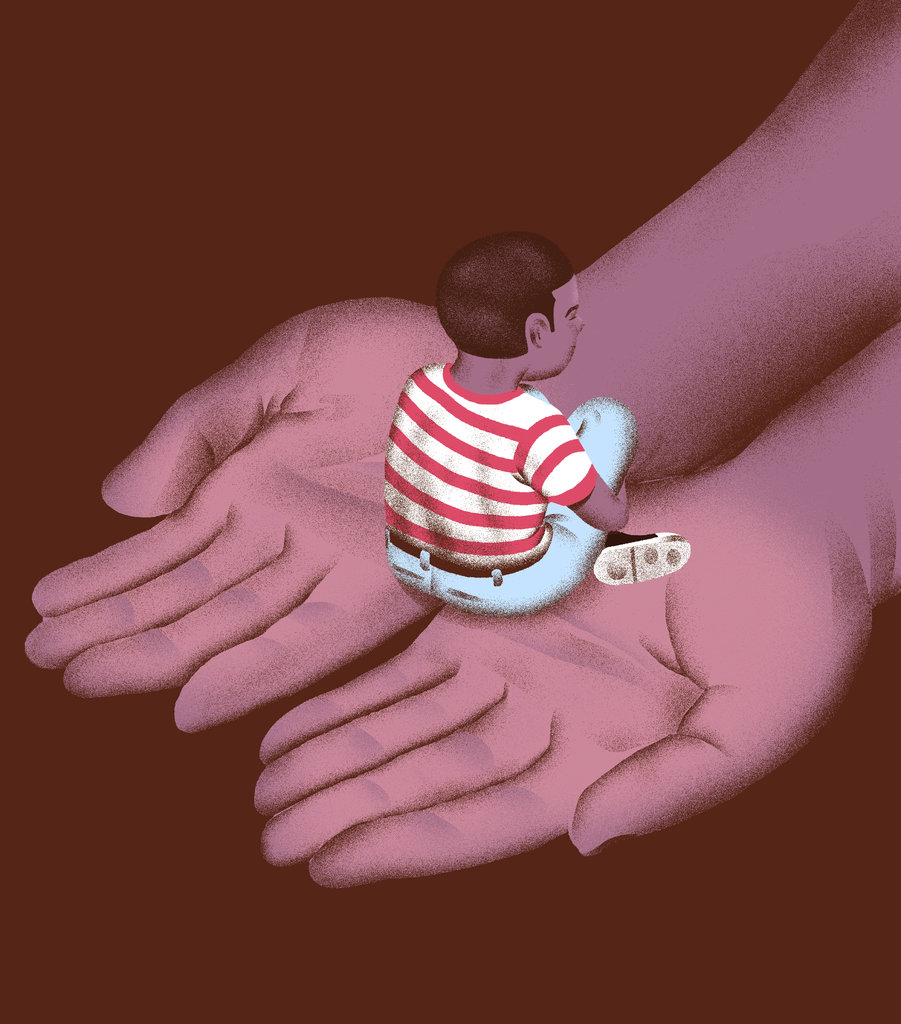IN A WARNING AGAINST SPANKING, SOME PEDIATRICIANS SEE AN ATTACK ON BLACK FAMILIES
Stacey Patton
Decades of research show that corporal punishment harms children and communities. Yet a vocal subgroup of doctors argues that an anti-spanking policy vilifies African-Americans.

In November, the American Academy of Pediatrics fortified its 20-year-old stance against spanking with a strongly worded new policy statement. Armed with decades of new research, the authors of the policy noted that spanking children does not improve their behavior and appears to be associated with negative outcomes, including increased aggression and mental health problems.
While the medical consensus is clear, and over 70 percent of American pediatricians agree that hitting children is damaging, many black pediatricians hold more positive attitudes about spanking. Moreover, a vocal subgroup is pushing back against the pediatrics academy’s new policy. By failing to draw a clear distinction between spanking and child abuse, these doctors say, the policy contributes to the demonization of black communities, where (as in many other communities, including Southerners and born-again Christians) corporal punishment is a cultural norm. And, they argue, pediatricians who discuss the harms of spanking during routine medical exams, as the policy recommends, risk alienating black parents.
Dr. Scott Krugman, a white pediatrician based at Sinai Hospital in Baltimore, said he witnessed the pushback in his professional circles.
“There are doctors who feel that the A.A.P.’s policy is heavy-handed and judgmental of black families. They also take issue with calling a simple spanking abuse,” Dr. Krugman said. “All pediatricians have serious questions about how to talk about the cultural context of physical punishment along with the science.”
Dr. Nia Heard-Garris, a black pediatrician based in Chicago, chairs the academy’s Provisional Section on Minority Health, Equity and Inclusion, which has more than 600 members from diverse backgrounds. Shortly after the academy released its policy, which was first drafted before the minority group was formed in 2017, she heard from some members who questioned “which voices were included in the discussion.”
“There were a lot of raw emotions and the feeling of being marginalized. There was also healthy debate about corporal punishment,” Dr. Heard-Garris said.
According to Dr. Krugman, many pediatricians worry that initiating exam-room conversations about spanking could raise black parents’ fears that their children’s doctors will collude with law enforcement and child protective services to have their children removed from their care. While black children do face a higher risk of being removed from their homes, there’s debate over whether there is racial bias in abuse reporting and whether child abuse is more common in black homes. Additionally, state and federal data show that most child abuse reports are screened outwithout any protective action. The pediatrics academy’s policy update does not change state laws that give parents the right to physically punish their children.
Understanding the pushback from some black pediatricians requires uncomfortable conversations about the cultural attachment many black families have to corporal punishment as a core pillar of responsible parenting in a racist society.
“We’re talking about some doctors who grew up with this tradition. So this policy is challenging how they grew up, who they are, what their mother and grandmother did,” said Dr. Heard-Garris, who is the mother of a 6-year-old boy she does not spank. “The backlash is not necessarily a lack of understanding of the science, but mostly an emotionally-charged response to personal experience.”
Dr. Keisha Bell, chief of pediatric critical care at Medstar Georgetown University Hospital in Washington, echoed Dr. Heard-Garris. “Many of us grew up in situations where spanking was part of our culture. None of us feels that we have trauma because of it. There’s a difference between spanking and abusing a child. I’m not sure if the studies do a good job of delineating that,” she said.
Dr. Michelle Collins-Ogle, an H.I.V. specialist who cares for adolescents and young adults, was disheartened by the way the academy’s policy “painted this broad brush over ways that people discipline their children,” she said. “It’s like anything you do as a corrective measure to get your kid to listen, then you’re a bad parent.”
Lack of diversity was also a problem, Dr. Collins-Ogle said. “The faces behind the policy and out front talking about it were all white. But they’re not raising black children and they don’t understand the nuances of raising a black child.”
Dr. Heard-Garris noted that, while the pediatric academy’s policy doesn’t explicitly target one group — and data show that the majority of parents across race and ethnicity hit their children — corporal punishment is a more public aspect of black culture, partly as a result of historical trauma. “If you look at the A.A.P.’s policy without understanding slavery, colonization, discrimination and police violence against black people, then doctors won’t understand why physical discipline in our communities is so pervasive,” she said.
Communities of color often mistrust the medical profession, which has a long and documented history of criminalizing and openly sexualizing black children in professional journals. Racist studies on black children have been used to rationalize public fears of and violence against black people. In the late 19th and early 20th centuries, pediatrics journals showcased the voices of white male pediatricians offering “proof” that black children were strong, insensate and hypersexual.
During slavery and Jim Crow, black families did not have the luxury of exploring a variety of childrearing strategies. As historian Leon Litwack noted in his famous book, “Trouble in Mind,” for black youths and their parents living under Jim Crow, the daily reminders of “place” and inequality were nearly everywhere. Just as they had been during slavery, black parents were powerless to protect their children from whippings and other assaults. Litwack explained that enslaved parents “were sometimes compelled to inflict the punishment themselves in the presence of whites to teach the disobedient child a lesson – and to avert even harsher punishment if meted out by the overseer or owner. The same mode of punishment, often for the same reasons, persisted into freedom.” Today, black parents and professionals still fear trigger-happy cops and a criminal justice system waiting with open jaws to ensnare black bodies.
“I ascribe to the historical necessity of having a child who will follow your direction, and that cannot be overstated,” Dr. Bell said. “When my son was a toddler, my husband and I made sure we let him know that we needed his compliance the first time.”
Dr. Collins-Ogle shares the same fear. “I tell my son that I don’t want to be the mother of the son that got shot because you said something wrong, you looked at the police the wrong way, you talked back to the teacher,” she said.
But corporal punishment won’t stall these forms of racialized social control, which began in the immediate afterlife of slavery. While black parents’ fears for their children’s lives are legitimate, they do not excuse preparatory violence in the home.
Between 2013 and 2017, 25 black children were killed by police officers, according to databases that track such killings; during that same period, 1,558 black children were killed as a result of maltreatment by their parents, according to reports published by the Children’s Bureau. Black children are still about twice as likely to be abused or killed than white children. The pervasive celebration of “whuppings” as a sacrosanct parenting tradition helps to fuel these outcomes. Whether spanking itself constitutes maltreatment is a matter of debate, but research suggests that spanking is a risk factor for abuse and fatalities.
In March, I spoke to pediatricians who attended the pediatrics academy’s trauma-informed training session in San Antonio, Tex., and in August I gave a presentation on race and spanking at the American Psychological Association conference in Chicago. I told both audiences that hitting children is not native to pre-colonial West African or indigenous cultures. As I described in my book, there’s no evidence of any form of ritualized physical punishment of children in precolonial West African societies prior to the Atlantic slave trade; African-Americans learned corporal punishment from white slave masters. I bluntly told them that one of the most powerful things pediatricians and psychologists can say to black parents is that whupping their children is one of the whitest things they can do. Physical punishment is not necessary in impoverished or dangerous neighborhoods; in fact, it is counterproductive because it teaches young people to solve conflicts with aggression and violence.
In light of the concerns raised by pediatricians of color, a spokeswoman for the American Academy of Pediatrics told me that there are plans to continue conversations on the spanking policy through collaborative, educational programming at its annual meeting in 2020. In July, the academy released its first policy statement on racism and its impact on child health.
“Kids of color in this country are not treated the same,” Dr. Heard-Garris said. “They experience exponentially more criticism, discrimination and violence. So we have to parent differently.” “I will do the opposite of society.” Dr. Heard-Garris continued. “I won’t parent my son with violence, but with more love. I will tell him how amazing, kind and smart he is. Not only because it is true, but because as soon as he leaves my door the world will tell him otherwise.”




